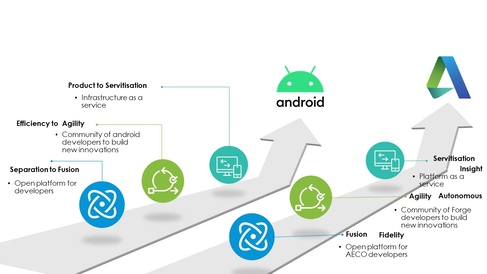
At the Cambridge Service Alliance's most recent Community of Interest, Dr Erika Pärn considered the development of digital twins in the construction sector: the challenges it faces and whether android operating systems could provide a useful roadmap for business model innovation.
Digitalising the construction sector is an urgent but difficult task. The potential benefits of developing digital twins of buildings and infrastructure are huge which also means that a lot of technology firms are vying for market share, whether that’s sector specialists like Autodesk or the tech giants like Google and Microsoft on the hunt for new opportunities.
In order to get a better understanding of how digital twin technology is likely to affect the sector, Pärn set about characterising the business model innovation displayed by android operating systems and comparing those with characteristics displayed by the construction sector.
For Pärn, innovations around android have three key aspects:
1) A move from separation to fusion: by creating a single open-source platform, android fused separate and competing technology developments into one concerted effort.
2) This had the effect of creating a community of developers capable of innovating at speed, or moving from efficiency to agility.
3) These developments enabled android to become more than a product, providing its infrastructure as a service.
Pärn sees similar patterns emerging with the business models of major technology providers such as Autodesk, with partially open platforms appearing and communities of developers seizing the opportunity to innovate on them. Pärn overlays these trends with three characteristics essential to the successful deployment of digital twins:
- fidelity - how faithful a representation is the digital of the physical?
- autonomy – can it operate without human intervention?
- insight – what does it tell us about how we can optimise the physical?
Much of the research published to date makes the case for digital twins as a way of optimising existing processes in order to increase productivity. But, asks Pärn, shouldn’t we be wondering if they can do more than that. If, in fact, they can help firms reimagine their business models?
But this is the construction industry where product margins are low – typically between 1.5 and 2% - and regulation is high, creating conditions which are not conducive to innovation. Even before the pandemic, construction was trailing a long way behind sectors such as manufacturing where digital twins are already deployed. According to Pärn, the construction industry is lagging years behind: without government intervention we are unlikely to see digital twins playing a meaningful role in it until 2040.
Using her six dimensions, Pärn has created a framework for further investigating the state of the UK construction sector and how ready (or not) it is to take advantage of digital twin technologies.
The findings will be important for the future of the sector: digital twins have a transformative role to play in creating a connected ecosystem that would overcome the current problems of industry fragmentation, improve design not just through visualisation but by providing insights into how a building is used throughout its life, support modularisation and pre-fabrication and revolutionise the services specialists can provide.
